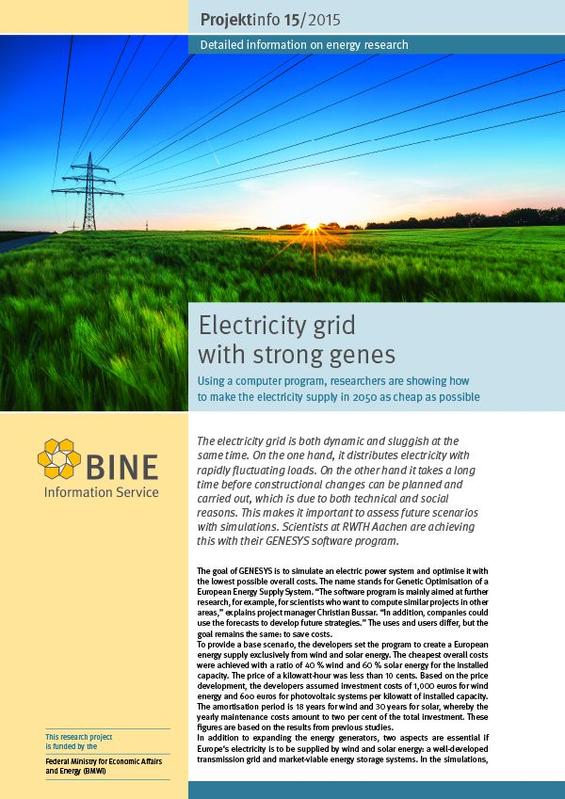Simulating the European electricity grid in 2050

The BINE Projektinfo brochure “Electricity grid with strong genes” (15/2015)
Software optimises scenarios with the aim of minimising the overall costs
Researchers and companies can enter their specific boundary conditions and calculate and evaluate scenarios. These results can be used, for example, to develop new strategies or help choose between different variants.
The developers have provided the program with a base scenario that envisages a European electricity grid based on wind and solar power. In addition to the grid expansion, the program also depicts the requirements for short-, medium- and long-term storage.
The software works with genetic and evolutionary algorithms that are borrowed from biology. The system independently assesses the variants calculated from the basic data and only uses the respective most cost-effective variants for the subsequent period.
The calculations depict several years in an hourly resolution. After several thousand passes, the results approach the optimum.
RWTH Aachen has developed this simulation program, which is called Genesys, and has launched it as freeware on the market. Genesys is aimed at scientists and companies.
You found all informations about the BINE Projektinfo brochure “Electricity grid with strong genes” (15/2015) here:
http://www.bine.info/en/press/press-releases/press/pressemitteilung/das-europaei…
Uwe Milles/Birgit Schneider
presse(at)bine.info
About BINE Information Service
Energy research for practical applications
The BINE Information Service reports on energy research topics, such as new materials, systems and components, as well as innovative concepts and methods. The knowledge gained is incorporated into the implementation of new technologies in practice, because first-rate information provides a basis for pioneering decisions, whether in the planning of energy-optimised buildings, increasing the efficiency of industrial processes, or integrating renewable energy sources into existing systems.
About FIZ Karlsruhe
FIZ Karlsruhe – Leibniz Institute for Information Infrastructure is a not-for-profit organization with the public mission to make sci-tech information from all over the world publicly available and to provide related services in order to support the national and international transfer of knowledge and the promotion of innovation.
Our business areas:
• STN International – the world’s leading online service for research and patent information in science and technology
• KnowEsis – innovative eScience solutions to support the process of research in all its stages, and throughout all scientific disciplines
• Databases and Information Services – Databases and science portals in mathematics, computer science, crystallography, chemistry, and energy technology
FIZ Karlsruhe is a member of the Leibniz Association (WGL) which consists of 87 German research and infrastructure institutions.
http://www.bine.info/en – BINE Informationsdienst
Media Contact
More Information:
http://www.fiz-karlsruhe.deAll latest news from the category: Power and Electrical Engineering
This topic covers issues related to energy generation, conversion, transportation and consumption and how the industry is addressing the challenge of energy efficiency in general.
innovations-report provides in-depth and informative reports and articles on subjects ranging from wind energy, fuel cell technology, solar energy, geothermal energy, petroleum, gas, nuclear engineering, alternative energy and energy efficiency to fusion, hydrogen and superconductor technologies.
Newest articles

Bringing bio-inspired robots to life
Nebraska researcher Eric Markvicka gets NSF CAREER Award to pursue manufacture of novel materials for soft robotics and stretchable electronics. Engineers are increasingly eager to develop robots that mimic the…

Bella moths use poison to attract mates
Scientists are closer to finding out how. Pyrrolizidine alkaloids are as bitter and toxic as they are hard to pronounce. They’re produced by several different types of plants and are…

AI tool creates ‘synthetic’ images of cells
…for enhanced microscopy analysis. Observing individual cells through microscopes can reveal a range of important cell biological phenomena that frequently play a role in human diseases, but the process of…





















